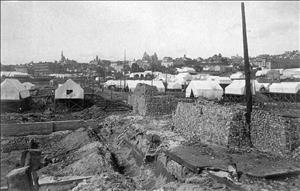On May 1, 1890, a measure banning tents within the area destroyed by the Great Seattle Fire on June 6, 1889, takes effect. The Seattle City Council passed the measure on April 11, 1890, but by the effective date there are still many tents on vacant lots and many property owners protest. City officials are concerned that property owners will not build permanent structures unless compelled to do so. The tents also invite theft of goods and some tenants' tents prevent the owners from rebuilding.
Tents Must Go
Councilman (later mayor) George W. Hall said:
"The tents must go. It would be a difficult matter to pick out the tenants who deserve leniency, but they have had several months notice and should by this time have found permanent quarters. I know of several firms who have options on permanent quarters and will, if the order is enforced, move, if not they will remain in their tents all summer."
Because of complaints from property owners, the council extended a grace period for tents to June 1, 1890 (almost a year after the fire burned down the business district of Seattle), provided that the owners filed with the City within five days proof that they had made arrangements to move into buildings not yet ready for occupancy. The order to remove all other tents would be enforced.

